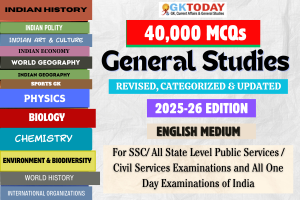Indian Polity & Constitution Objective / Multiple Choice (MCQs) Questions for Preparation of SSC-CGL, UPSC Civil Services, NDA, CDS, Railways and State Level Public Services Examinations.
21. Consider the following mechanisms:
- Prorogation
- Adjournment
- Dissolution
Which of these can lead to the termination of the sitting of the House of People?
[A] Only Prorogation and Adjournment
[B] Only Prorogation and Dissolution
[C] Only Dissolution
[D] Prorogation, Adjournment and Dissolution
Show Answer
Correct Answer: D [Prorogation, Adjournment and Dissolution]
Notes:
The sitting of the House of People can be terminated by either adjournment, prorogation, or dissolution. Adjournment terminates the sitting for a specified time which may be hours, days or weeks. Prorogation terminates the session of the House and the House can sit again only when it is summoned by the President to meet again. Dissolution ends the very life of the existing House, and a new House is constituted after general elections are held.
22. The Twenty-Second Amendment Act , 1969 facilitated the creation of a new autonomous State of Meghalaya from which state?
[A] Arunachal Pradesh
[B] Nagaland
[C] Assam
[D] Manipur
Show Answer
Correct Answer: C [Assam]
Notes:
The Twenty-Second Amendment of 1969 to the Constitution of India facilitated the creation of a new autonomous State of Meghalaya within the State of Assam.
23. National Judicial Appointments Commission was established by which amendment act?
[A] 91st Amendment Act, 2003
[B] 96th Amendment Act, 2011
[C] 99th Amendment Act, 2014
[D] 101st Amendment Act, 2016
Show Answer
Correct Answer: C [99th Amendment Act, 2014]
Notes:
99th Constitutional Amendment Act, 2014 provided for establishment of National Judicial Appointments Commission. However, in 2015 the Supreme Court of India has declared this amendment act as unconstitutional and void.
24. In which yer was the first Parliamentary Forum on Water Conservation and Management was constituted?
[A] 2004
[B] 2005
[C] 2006
[D] 2007
Show Answer
Correct Answer: B [2005]
Notes:
The first Parliamentary Forum on Water Conservation and Management was constituted by the government of India in the year 2005. Later seven more parliamentary forums were created by the government.
25. Who is empowered to direct that an act of Parliament does not apply to a scheduled area in the state?
[A] Governor
[B] President
[C] Prime Minister
[D] Members of Lok sabha
Show Answer
Correct Answer: A [Governor]
Notes:
The governor of the state is empowered to direct that an act of Parliament does not apply to a scheduled area in the state or apply with specified modifications and exceptions.
26. Who can make laws on any matter in the State List for implementing the international treaties, agreements or conventions?
[A] The Parliament
[B] The Council of Ministers
[C] The Prime Minister
[D] The Vice President
Show Answer
Correct Answer: A [The Parliament]
Notes:
The Parliament of India is empowered to make laws on any matter in the State List for implementing the international treaties, agreements or conventions. The provision enables the Central government to fulfill its international obligations and commitments.
27. Which of the following Articles Constitution deal with the trade, commerce and intercourse within the territory of India?
[A] Article 300 to 306
[B] Article 401 to 407
[C] Article 365 to 387
[D] Articles 301 to 307
Show Answer
Correct Answer: D [Articles 301 to 307]
Notes:
Articles 301 to 307 in Part XIII of the Constitution of India deal with the trade, commerce and intercourse within the territory of India. According to Article 301 the trade, commerce and intercourse throughout the territory of India shall be free.
28. Where was the President’s Rule imposed for the first time under Article 356?
[A] Bihar
[B] Uttar Pradesh
[C] Travancore-Cochin
[D] PEPSU
Show Answer
Correct Answer: D [PEPSU]
Notes:
The President’s Rule under Article 356 of the Constitution of India was for the first time imposed in the year 1951 in the former state of Punjab and East Punjab States Union (PEPSU).
29. Which of the following are proper grounds for imposition of President’s Rule in a state?
[A] When there is Hung Assembly
[B] When the majority party declines to form a ministry and the governor cannot find a coalition ministry
[C] Internal subversion
[D] All of the above
Show Answer
Correct Answer: D [All of the above]
Notes:
All of the above are proper grounds for imposition of President’s Rule in a state. When there is Hung Assembly, when the majority party declines to form a ministry and the governor cannot find a coalition ministry, internal subversion, when the constitutional direction of the Central government is disregarded by the state government etc.
30. How many high court judges have been impeached so far?
[A] 1
[B] 2
[C] 4
[D] None
Show Answer
Correct Answer: D [None]
Notes:
The procedure for the impeachment of a judge of a high court is the same as that for a judge of the Supreme Court of India. No judge of a high court has been impeached so far.
 These questions are part of GKToday's 40,000+ GK Questions Course in GKToday Android Application which provides more than 40K questions with explanations suitable for all Competitive Exams of India.
These questions are part of GKToday's 40,000+ GK Questions Course in GKToday Android Application which provides more than 40K questions with explanations suitable for all Competitive Exams of India.
